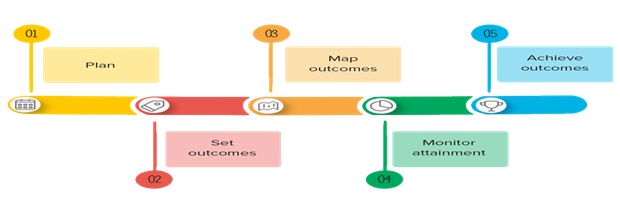Enhancing the quality of teaching and learning
To be a TOTAL Teacher
Transforming Outcomes Through Active Learning
PHILOSOPHY OF OUTCOME BASED EDUCATION
Outcome Based Education (OBE) primarily focuses on building each part of an educational system around goals (Outcomes). Hence it emphasis on three major components viz. (I) Stating what you want your students to be able to do at the end of the program (II) Orienting teaching and other academic processes to facilitate students to do what they are expected to do (III) Assessing the students whether they are able to do what they are expected to do.
The shift from the concrete to the abstract makes teaching of engineering design courses more challenging. The target set forth by good academic institutions is to have a system in place that can produce graduates who are well equipped and suitably qualified to practice professional engineering in a continually changing and increasingly complex global environment.
India demonstrated the commitment to move to the outcome based education (OBE). KCDC elaborates the process and the assessment methodology by adopting various parameters, tools and rubrics for successful paradigm shift towards OBE for the existing engineering programs. One of the criteria in OBE is the assessment of learning outcomes as achievement indicator for continuous performance quality management. This criterion is driving educators to look for ways to deliver continuous improvement. It also reports on practical method of assessing the learning outcomes on unit by unit and the contributions to achieving the learning outcomes.
KCDC ascertains the principles and methodology of the TOTAL teacher. It adapts active learning techniques to an Outcomes-based teaching framework to enable teachers to adapt and fine tune their teaching practice so that their students can more effectively achieve course learning outcomes.
Roadmap of OBE

KCDC Outcomes:
- Understand the importance of OBE and prepare an overall OBE plan for a program.
- Develop and write effective program objectives and program outcomes
- Explain the importance and be able to select appropriate assessment tools prepare performance criteria for course and program level outcomes
- Explain the needs to shift to students-centered learning methods and be able to create an effective learning environment in the classroom
- Design and plan an aligned learning environment to support students learning using informal cooperative learning activities
- Form and support development of learning teams in classroom
- Explain formal cooperative learning structure and its principles
- Design and plan learning environments that support the development of learning teams
Highlights:
- High Impact Teaching Skills
- Analogies to Teach effectively
- Innovation and creativity in Teaching
- Paradigm shift from teaching to learning
- Activity based and project based learning
- Classroom management
- Tapping on Multiple Intelligence
- Implementing Bloom’s Taxonomy
- Mind Mapping for better teaching
- Micro Teaching
- Question framing based on BT
- Table of Specification (TOS)
- Item Analysis